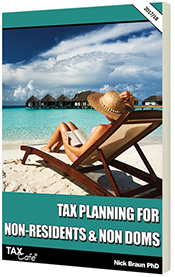New Disclosure Opportunity
(NDO) for Offshore Income
Details for NDO for offshore income & gains
HM REVENUE & Customs has announced details of its New Disclosure Opportunity (NDO) for those with undeclared income or gains from overseas sources, such as foreign bank accounts and rental properties.
This follows a recent ruling which gave HMRC the green light to force over 300 financial institutions to hand over details of overseas accounts registered at UK addresses.
Instead of sifting through a mountain of bank statements, the taxman is giving the account holders concerned (estimated to number over 100,000) a “last opportunity” to come clean and self-assess the amount of tax they owe. This so-called ‘amnesty’ also extends to others with undeclared foreign income or gains.
Those affected will still have to pay back taxes plus interest but the additional penalty will be less severe than normal, generally restricted to just 10% of the outstanding tax (or 20% for those who were contacted by HMRC during its 2007 crackdown and failed to act).
Those who do not come forward voluntarily face penalties of up to 100% if the taxman comes calling... plus the time, cost and stress of a full-blown tax investigation.
The message is clear. HMRC has set out to build a list of every UK resident with an offshore bank account (including accounts that are now closed). Those who do not come forward now and use the relatively lenient NDO could be committing financial suicide.
Not that life will be plain sailing for those who do come forward. It’s quite possible HMRC will also start poking around in their other tax affairs. According to Dave Hartnett, HMRC Permanent Secretary for Tax: “If you’ve been dishonest in relation to hiding your offshore account and not putting it on your tax return, then our working assumption is that there will be a risk that you will be dishonest onshore as well.
“But the crucial issue is that people who want to take advantage of this opportunity need to come clean on everything, onshore and offshore, and then can be dealt with inside the disclosure regime.”
Some of those affected by the crackdown include overseas property investors. HMRC is likely to scrutinise not only the interest from their overseas bank accounts but their overseas rental income and property sales as well.
There are two stages to using the NDO. A notification of your intention to disclose can be made:
- On paper from 1 September 2009 to 30 November 2009
- Online from 1 October 2009 to 30 November 2009
Actual disclosures and tax payments can then be made:
- On paper from 1 September 2009 to 31 January 2010
- Online from 1 October 2009 to 12 March 2010
Different deadlines apply in the case of Liechtenstein accounts.
At present, it appears that disclosures relating solely to UK income may not qualify and could be subject to standard penalties. The position is unclear but we will keep you up to date with any important developments.
Finally, remember that if you are non-domiciled or non-ordinarily resident in the UK, you may be entitled to special tax treatment. Although you may be UK resident, you do not necessarily have to pay tax on your foreign source income or gains.






